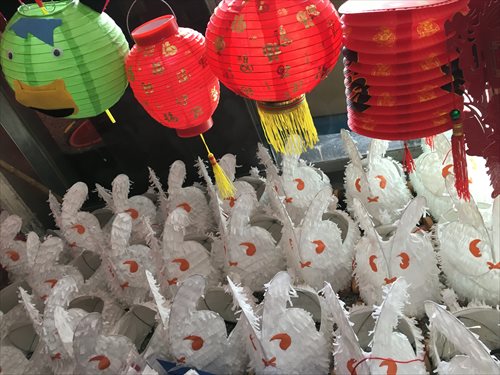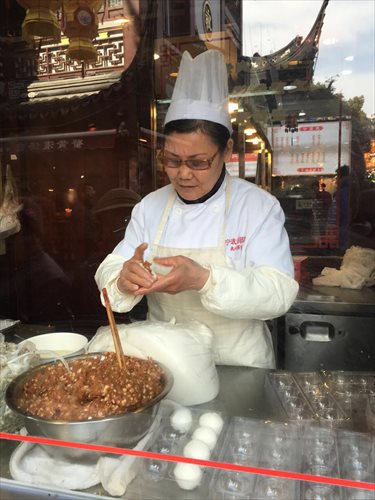HOME >> METRO SHANGHAI
Shanghai’s circus-like Lantern Festival is losing its traditional essence
By Ni Dandan Source:Global Times Published: 2016-2-17 18:08:01
Lanterns! Lanterns everywhere! Shanghai is currently being illuminated by its largest-ever lantern extravaganza, which takes place at Expo Park and features gigantic lights of all shapes, sizes and themes. In accordance with China's penchant for all things big, large and great, the Shanghai lantern fest just might even set a new Guinness World Record.
But for Shanghainese locals, the circus-like atmosphere of this year's Lantern Festival simply can't hold a candle to the good old days, when the annual event had more personal meaning and cultural significance beyond just trying to be big.
"It's supposed to be a day for family reunion, right?" an elderly woman surnamed Jia who was accompanying her young grandson to a lantern show in the area around the Temple of City God, hypothetically asked the Global Times. Jia said that because her adult son and daughter-in-law were so busy with work, the special occasion was no longer very special for their family.
Surveying the throbbing crowds visiting the landmark scenic spot that day, there were also some foreign tourists. Sara Monte, from Spain, was one such Westerner on holiday with her husband and four children. Monte said that while she is aware that China has just entered the Year of the Monkey on the lunar calendar, she was oblivious of the meaning behind all the lanterns. "All I knew was that the Temple of City God is a must-visit place."
Cherished concepts
Foreign tourists can certainly be excused for being unfamiliar with Chinese customs and traditions, but for the droves of Chinese visitors who opted to spend the holiday at Shanghai's overcrowded sites, one wonders how one of our culture's most beloved occasions has devolved into such a circus.
Meanwhile, Shanghai locals who anticipated the chaos of popular venues like Expo Park and Yuyuan Garden decided to skip the spectacle and stay home to practice truly traditional customs. Eating yuanxiao (small balls made of glutinous rice flour with sesame, bean paste, jujube paste or meat as filling) could be one lesser-known local custom to foreigners, but it remains as precious as ever to Chinese.
Yuanxiao are in fact so beloved here that numerous snack shops across the city specializing in these treats were packed with lines of locals as long as those tourists queued outside of the Yuyuan Garden. But more important than just its delicious taste, yuanxiao, which is also called tangyuan, has a symbolic meaning.
The pronunciation of tangyuan is similar to tuanyuan, which literally means "reunion." Eating these snacks on the Lantern Festival denotes union, harmony and happiness for the family, all which are extremely cherished concepts in Chinese culture.
Fading traditions
"It's not the lanterns that I care about as much as the importance that people attach to this day," said a Songjiang native surnamed Meng, who was touring around the Temple of City God the other day.
"When I was a child, Lantern Festival was as important as Chinese New Year's Eve, when families would reunite together for a meal. What's more exciting was that after the meal, almost all people in my hometown would gather on the only main shopping street in town to watch fireworks while children walked with their handmade rabbit-shaped lanterns," the woman recalled. "You just don't see that anymore."
The rabbit-shaped lantern that Meng referred to does continue to exist in today's markets. But because street vendors now sell factory-made versions for overpriced amounts of money to play on people's nostalgia, much of the charm has disappeared, thereby commercializing yet another aspect of Chinese culture.
Along with the new ban on fireworks that made this year's New Year's Eve the quietest in Shanghai's history, there's no denying that we are witnessing the end of days of traditional Chinese customs. Getting in the Guinness World Records may be great for the future ticket sales of the city's annual Lantern Festival, but locals are left wondering what any of it means anymore.
Origin of Lantern Festival
Lantern Festival falls on the 15th day of the first lunar month. As early as the Western Han Dynasty (206BC-AD25), it had become a festival of great significance.
Among the many stories about this festival, one version says that throughout the Han Dynasty (206BC-AD220), Buddhism flourished in China. One emperor heard that Buddhist monks would watch sarira, or remains from the cremation of Buddha's body, and light lanterns to worship Buddha on the 15th of the first lunar month, so he ordered lanterns in the imperial palace.
Later, the Buddhist rite developed into a grand festival among common people and its influence expanded from the Central Plains to the whole of China.
Another legend has it that the festival was set up by Emperor Liu Heng of the Han Dynasty for commemorating the end of a rebellion initiated by the Lü family. After the death of Han Emperor Liu Bang, his son Liu Ying ascended the throne. However, Liu Ying's disposition was weak and indecisive and his power gradually fell into the hands of his mother, Empress Lü. Despite disagreements from many ministers, the empress started to reduce the status of people in the royal family.
After Empress Lü died, her family members were afraid of retaliation and eventually decided to launch a rebellion to kill the opposition. The rebellion was finally pacified by the Liu family and the second son of Liu Bang, Liu Heng, became the emperor.
Liu Heng felt that the hard-won peace and prosperity were so precious that he dictated the day this rebellion was put to an end, which happened to be the 15th of the first lunar month, as the day that all people should decorate their homes with lanterns to celebrate.


Newspaper headline: Dimming lights
But for Shanghainese locals, the circus-like atmosphere of this year's Lantern Festival simply can't hold a candle to the good old days, when the annual event had more personal meaning and cultural significance beyond just trying to be big.
"It's supposed to be a day for family reunion, right?" an elderly woman surnamed Jia who was accompanying her young grandson to a lantern show in the area around the Temple of City God, hypothetically asked the Global Times. Jia said that because her adult son and daughter-in-law were so busy with work, the special occasion was no longer very special for their family.
Surveying the throbbing crowds visiting the landmark scenic spot that day, there were also some foreign tourists. Sara Monte, from Spain, was one such Westerner on holiday with her husband and four children. Monte said that while she is aware that China has just entered the Year of the Monkey on the lunar calendar, she was oblivious of the meaning behind all the lanterns. "All I knew was that the Temple of City God is a must-visit place."
Cherished concepts
Foreign tourists can certainly be excused for being unfamiliar with Chinese customs and traditions, but for the droves of Chinese visitors who opted to spend the holiday at Shanghai's overcrowded sites, one wonders how one of our culture's most beloved occasions has devolved into such a circus.
Meanwhile, Shanghai locals who anticipated the chaos of popular venues like Expo Park and Yuyuan Garden decided to skip the spectacle and stay home to practice truly traditional customs. Eating yuanxiao (small balls made of glutinous rice flour with sesame, bean paste, jujube paste or meat as filling) could be one lesser-known local custom to foreigners, but it remains as precious as ever to Chinese.
Yuanxiao are in fact so beloved here that numerous snack shops across the city specializing in these treats were packed with lines of locals as long as those tourists queued outside of the Yuyuan Garden. But more important than just its delicious taste, yuanxiao, which is also called tangyuan, has a symbolic meaning.
The pronunciation of tangyuan is similar to tuanyuan, which literally means "reunion." Eating these snacks on the Lantern Festival denotes union, harmony and happiness for the family, all which are extremely cherished concepts in Chinese culture.
Fading traditions
"It's not the lanterns that I care about as much as the importance that people attach to this day," said a Songjiang native surnamed Meng, who was touring around the Temple of City God the other day.
"When I was a child, Lantern Festival was as important as Chinese New Year's Eve, when families would reunite together for a meal. What's more exciting was that after the meal, almost all people in my hometown would gather on the only main shopping street in town to watch fireworks while children walked with their handmade rabbit-shaped lanterns," the woman recalled. "You just don't see that anymore."
The rabbit-shaped lantern that Meng referred to does continue to exist in today's markets. But because street vendors now sell factory-made versions for overpriced amounts of money to play on people's nostalgia, much of the charm has disappeared, thereby commercializing yet another aspect of Chinese culture.
Along with the new ban on fireworks that made this year's New Year's Eve the quietest in Shanghai's history, there's no denying that we are witnessing the end of days of traditional Chinese customs. Getting in the Guinness World Records may be great for the future ticket sales of the city's annual Lantern Festival, but locals are left wondering what any of it means anymore.
Origin of Lantern Festival
Lantern Festival falls on the 15th day of the first lunar month. As early as the Western Han Dynasty (206BC-AD25), it had become a festival of great significance.
Among the many stories about this festival, one version says that throughout the Han Dynasty (206BC-AD220), Buddhism flourished in China. One emperor heard that Buddhist monks would watch sarira, or remains from the cremation of Buddha's body, and light lanterns to worship Buddha on the 15th of the first lunar month, so he ordered lanterns in the imperial palace.
Later, the Buddhist rite developed into a grand festival among common people and its influence expanded from the Central Plains to the whole of China.
Another legend has it that the festival was set up by Emperor Liu Heng of the Han Dynasty for commemorating the end of a rebellion initiated by the Lü family. After the death of Han Emperor Liu Bang, his son Liu Ying ascended the throne. However, Liu Ying's disposition was weak and indecisive and his power gradually fell into the hands of his mother, Empress Lü. Despite disagreements from many ministers, the empress started to reduce the status of people in the royal family.
After Empress Lü died, her family members were afraid of retaliation and eventually decided to launch a rebellion to kill the opposition. The rebellion was finally pacified by the Liu family and the second son of Liu Bang, Liu Heng, became the emperor.
Liu Heng felt that the hard-won peace and prosperity were so precious that he dictated the day this rebellion was put to an end, which happened to be the 15th of the first lunar month, as the day that all people should decorate their homes with lanterns to celebrate.

Rabbit lanterns displayed at the Temple of City God for the Lantern Festival

Yuanxiao making at the temple
Photos: Ni Dandan/GT
Newspaper headline: Dimming lights
Posted in: Metro Shanghai